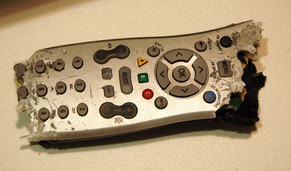
If you've completed an online quiz about control, then you're already to a good start in reading this blog post. Because I will be discussing how control impacts our relationships, primarily with our romantic partners. "Control" is not a new topic of discussion. It's probably a beaten down subject that you've heard about many times before. So hopefully this post will be useful to you.
Most likely you've heard or thought that needing or having control is bad for you or your relationships. Actually, I'd like to point out that it's not a bad thing. Imagine on a large scale what our city would be if there were not someone trying to exert control or in this case "order" to our city. It would be chaos. Assuming that we all want to live in an orderly city where we can thrive, it makes perfect sense that we would want that orderliness in our own lives. It's necessary to need to feel there is a certain amount of control in our lives. And here it comes, however there is a fine line we need to draw between chaos and order.
I have known people so bent on having control or fearing they may lose control, that order and harmony is no longer the goal. These people are so rigid because of their controlling ways, that they create chaos around them. Too much or too little control is bad. Goldilocks was right! We need control, but the amount should be "just right". So in what ways does "control" impact our relationships? Firstly, it challenges the balance of a healthy relationship. There is no perfect or one size fits all way to describe a healthy relationship, but one aspect of a healthy relationship is where both partners feel equal, despite what roles or responsibilities they have. When we exert too much control into our relationship, and conflict arises, then this means that the relationship's balance has been tipped. For example, a husband demanding his wife be home at exactly the same time everyday, will usually result in conflict. In this example, the husband's demand signifies that he no longer sees his wife as an equal partner in the relationship. If he did, she would have equal say in whether or not this demand is reasonable. He exerts his power/control over the situation by making this demand.
The sad part is that many times "control" is exerted from good intentions. However if you hear your partner saying "you're so controlling" or "stop trying to control me", then this is feedback that your good intentions are not very nice. And definitely not working for your relationship. So take a step back, put yourself in your partner's shoes, and then ask yourself whether or not you would want to be controlled in that way. Most likely the answer is "no".
Most likely you've heard or thought that needing or having control is bad for you or your relationships. Actually, I'd like to point out that it's not a bad thing. Imagine on a large scale what our city would be if there were not someone trying to exert control or in this case "order" to our city. It would be chaos. Assuming that we all want to live in an orderly city where we can thrive, it makes perfect sense that we would want that orderliness in our own lives. It's necessary to need to feel there is a certain amount of control in our lives. And here it comes, however there is a fine line we need to draw between chaos and order.
I have known people so bent on having control or fearing they may lose control, that order and harmony is no longer the goal. These people are so rigid because of their controlling ways, that they create chaos around them. Too much or too little control is bad. Goldilocks was right! We need control, but the amount should be "just right". So in what ways does "control" impact our relationships? Firstly, it challenges the balance of a healthy relationship. There is no perfect or one size fits all way to describe a healthy relationship, but one aspect of a healthy relationship is where both partners feel equal, despite what roles or responsibilities they have. When we exert too much control into our relationship, and conflict arises, then this means that the relationship's balance has been tipped. For example, a husband demanding his wife be home at exactly the same time everyday, will usually result in conflict. In this example, the husband's demand signifies that he no longer sees his wife as an equal partner in the relationship. If he did, she would have equal say in whether or not this demand is reasonable. He exerts his power/control over the situation by making this demand.
The sad part is that many times "control" is exerted from good intentions. However if you hear your partner saying "you're so controlling" or "stop trying to control me", then this is feedback that your good intentions are not very nice. And definitely not working for your relationship. So take a step back, put yourself in your partner's shoes, and then ask yourself whether or not you would want to be controlled in that way. Most likely the answer is "no".
 RSS Feed
RSS Feed
